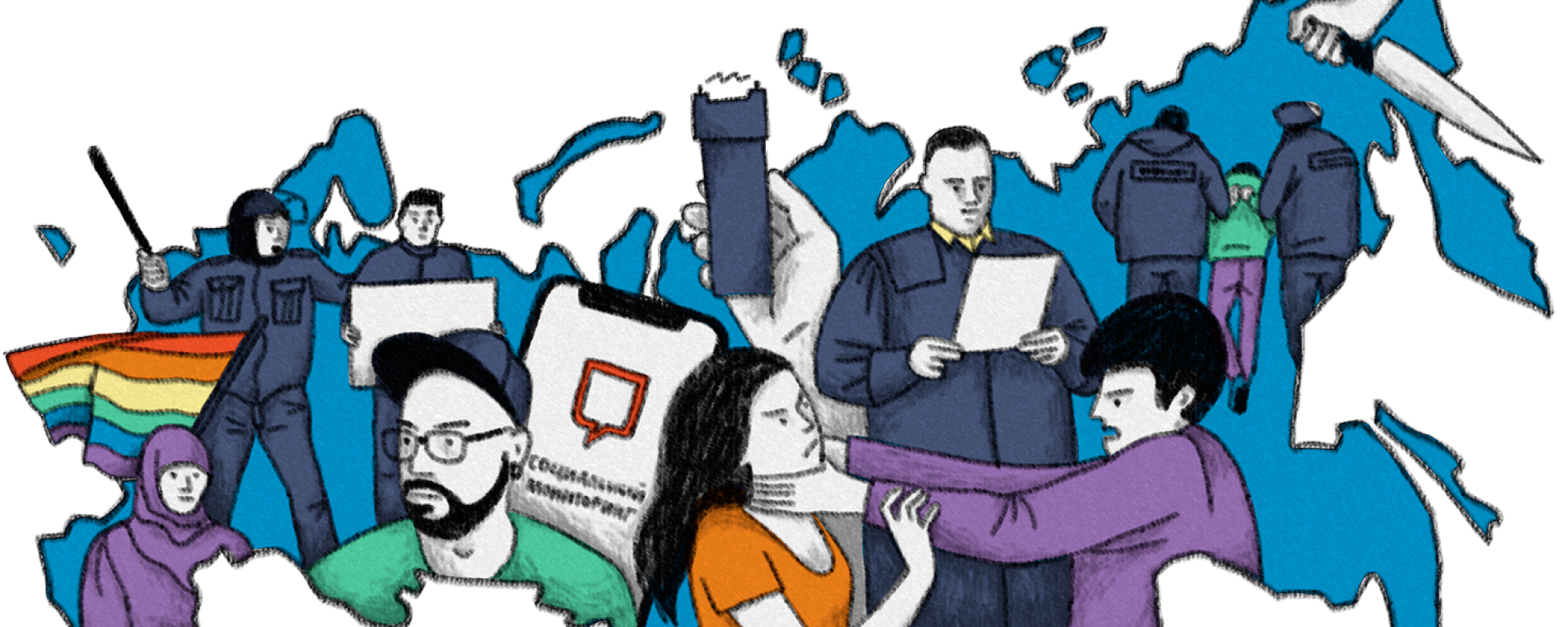Доклад на русском языке: Ограничение мирных собраний в России с 2015 по 2020 годы
As a part of a coalition of civil society organizations, we have submitted a report about Russia’s Compliance with the International Covenant on Civil and Political Rights from 2015 to 2020 to the United Nations Human Rights Committee. The English version of the report was published on the Committee’s website. We also sent to the Committee attachments with a list of criminal cases against participants and organizers of public events and list of cases, in which authorities have not suggested an appropriate alternative place or time for an event. This part of the report has been prepared by OVD-Info and is about freedom of assembly.
At present, the situation with freedom of peaceful assembly in the Russian Federation remains difficult. The suppression of peaceful assemblies continues: mass arrests, criminal and administrative prosecution of organizers and participants of protests. Dissemination of information on unapproved actions is also limited, and the approval procedure remains unbalanced and disproportionately complicated. Legislative changes introduced since 2015 show a prohibitive trend in law.
Mass arrests and administrative prosecution
Detentions at peaceful gatherings are in the thousands. In Moscow in 2019, 3637 people were detained at public rallies. In 2019, Russian courts considered 4974 cases of violation on the procedure for holding gatherings. The total amount of fines for participation in peaceful gatherings in 2015-2019 was 168,465,500 rubles (approximately €2,161,353 as of June 2020). The largest number of arrests and prosecutions were observed at the following gatherings: protests in Ingushetia against the establishment of an administrative border with Chechnya in 2018-2019, anti-corruption protests on March 26, 2017, a rally against the persecution of journalist Ivan Golunov on June 12, 2019, protests against the refusal to register candidates for the Moscow City Duma elections in summer 2019.
Criminal prosecution of peaceful protesters
Starting in 2015 a criminal article introduced in 2014 has begun being applied. It defines liability for repeated participation in peaceful non-agreement actions — 212.1 of the Criminal Code of the Russian Federation, which is punished by up to 5 years in prison. In December 2015 Ildar Dadin was sentenced to three years in prison. In September 2019 Konstantin Kotov was sentenced to 4 years of imprisonment for five peaceful gatherings. In 2017 and 2020 the Constitutional Court of the Russian Federation deliberated the constitutionality of such harsh responsibility for participation in peaceful gathering, but both times the article was not found to contradict the Russian Constitution.
Participants and organizers of public events are also held criminally liable under other articles: organization and participation in mass riots, hooliganism, and use of violence against police officers. Examples of «violent» acts include touching a police officer’s helmet, throwing a paper cup or an empty plastic bottle at police officers. Between 2015 and May 2020 dozens of people have been prosecuted and have received prison sentences or fines (see attachment 1).
Police officers disproportionately used force when apprehending demonstrators. For example, at least 36 people (of whom at least three were minors) were injured in arrests on 27 July 2019. Complaints regarding the use of force by police officers have generally been unfruitful.
Restrictions on the dissemination of information about rallies
Dissemination of information about unapproved gatherings may lead to entire internet resources being blocked without a court decision. For private citizens it may entail administrative responsibility, while «repeated» actions may lead to up to five years in prison.
Procedure for approval of public events
The procedure for coordinating public events in Russia is unbalanced and unfavourable for the organizers. This is evidenced by the following problems:
• strict deadlines for approval of events and a ban on spontaneous events, even with a small number of participants;
• broad powers for the authorities in practice lead to arbitrary refusals and offerings of inadequate alternatives for locations and terms for events (see attachment 2);
• the courts take a formal approach and do not assess the proportionality and necessity of refusals;
• opacity of the system: the authorities do not publish statistics on how many applications are approved, which only encourages abuse.
Questions to the Russian government
We ask you to ask the Government of the Russian Federation for the following data related to the state of freedom of peaceful assembly in the period from 2015 to now:
- the real negative consequences of the specific actions of participants in public events who have been prosecuted under article 212.1 of the Criminal Code and those involved in other cases listed in the attachment 1;
- the specific actions aimed at investigating cases of the use of force by law enforcement officials against participants in public events, the protocol of action in obtaining such information, the sanctions imposed in this regard, and the measures taken to prevent such situations in the future;
- the annual amount of submitted applications for public events and the decisions the authorities have handed down, detailed by region.
We also ask the Government of the Russian Federation be asked the following questions:
Which aspects of public events may be restricted in connection with international sporting events (to specify the following) paragraph 7 part 14.2 Article 20 of the Federal Law from December 4, 2007 N 329-FZ «On Physical Culture and Sports»)?
- How is the boundary of the territory on which these restrictions will be applied determined (a specific locality, region, several regions, the whole country)?
- What are the criteria for imposing restrictions in a particular territory (location of sporting events, location of training bases, etc.)?
- Provide a list of events planned before 2030 for which these restrictions may be imposed.



